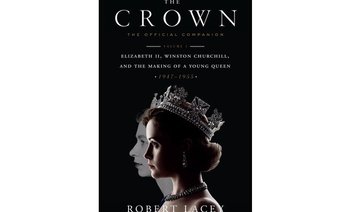Syria is an ongoing tragedy and for many Syrians living abroad, their homeland is nothing but a memory. The country they knew no longer exists.
Alia Malek, an award-winning journalist and civil rights lawyer who was born in Baltimore to Syrian immigrant parents, has released a new book titled: “The Home That Was Our Country.” In the book, Malek tells the story of Syria through her grandmother’s apartment building and the Damascene neighborhood that surrounds it. Malek decided not to write about the bombing, the war zone and the political factions, but to focus on the lives of ordinary people. “It’s so utterly human and relatable and accessible. I think a lot of the humanity of Syria (is) lost when we only focus on what is happening at a military level or at a political level. You know, Syrians themselves are entertaining, are intelligent. They’re the best people to tell their own story. That’s why, you know, I kind of invited the reader to come experience this as if they were a member of the building, or a member of the household or a member of the neighborhood. That’s the only way that I was going to be able to break through the sort of stone-facedness with which I think a lot of us are looking at Syria these days,” Malek said in an interview with media personality Lourdes Garcia-Navarro.
The story begins with her great-grandfather, who was born under Ottoman rule. Malek acknowledges that “Origins” was the most challenging chapter to write. She follows her family under the repressive regime of former Syrian leader Hafez Assad and his son Bashar. “It was a fascinating activity. You have to wade through… what is legend and lore about a family and sort of start trying to piece together what is actually real,” Malek said.
Her research for the book began when Malek moved to Damascus in 2011. She had arrived in Syria to finish restoring her grandmother’s house at a time when the entire region was experiencing the winds of change and she wanted to write a book about her grandmother, Salma, which she had been planning to do for a long time. During the two years she spent researching her family, she became increasingly worried about her safety and theirs.
The book begins with Malek declaring that a number of her family members wanted her to leave Syria. “By the time I left Syria in May 2013, many in my family were happy to see me go. For them, the day hadn’t come soon enough.”
When authoritarian regimes in Tunisia, Egypt and Libya were overthrown during the Arab Spring, all eyes turned to Syria as if it would be next in line. However, the regime that had ruled Syria for more than 40 years remained firmly in control.
“I wanted to be there at a moment when the entire region was in the throes of change. For an optimist, Syria was on the precipice of something better. For the pessimist, it teetered dangerously on the abyss,” Malek wrote.
Malek’s presence in Syria was causing suspicion and tension among those who knew her. Some believed she was a spy while others feared for their safety. Malek spends a lot of time in the book talking about how the state rules with fear, saying: “One of the ways the Assad regime has been able to control the population is that if they’re going to punish you for your dissent or your behavior, they don’t just punish you, they can punish those around you. Let’s say they detain me, maybe I’d get out eventually. But many people would still be left behind.”
There is much that has remained unspoken and it has taken a toll on society. Malek believes that these unspoken traumas are relevant to understanding Syrian society and what is going to emerge when the dust settles.
“And now, how many Syrians are outside of Syria? They are able to have unchaperoned interactions with each other that aren’t moderated by the state. I am hopeful about those interactions. They might be a way for Syrians to get to know each other in a way that they weren’t able to before and to represent, for themselves, what they think and may believe. It’s the only way to go forward into the future, I think,” Malek wrote.
This memoir reads like a novel. It alternates between reflective moods and lively dialogues. Malek blends the story of her family with the history of Syria in what has turned out to be an engaging and interesting book.
At the end of her memoir, Malek reveals her hope that “Syrian society could maybe one day be pieced together along new lines that we hadn’t previously imagined. Friendships and relationships were being built among folks who would never have met each other before because their lives would not have taken them beyond their own villages. It was also bringing them into contact with Syrians from the diaspora of different classes. The status quo in Syria had depended so much on keeping people afraid of each other, of telling each other that the other would devour him or her if given the opportunity.”
She does, however, share a tragic observation and writes: “It’s more than a conflict. It’s a calamity. It’s a catastrophe.”
Book Review: A memoir of life in Syria
Book Review: A memoir of life in Syria

What We Are Reading Today: Little Bosses Everywhere by Bridget Read

In “Little Bosses Everywhere,” journalist Bridget Read tells the gripping story of multilevel marketing in full for the first time.
“Little Bosses Everywhere” exposes the deceptions of direct-selling companies that make their profit not off customers but off their own sales force.
The book lays out an almost prosecutorial case against many multilevel marketing schemes, explaining why regulators need to take the industry seriously, and the larger story it tells about whom the economy has set up to fail.
The book “reads like a thriller as it investigates the birth and growth of this shadowy and sprawling industry that polished up door-to-door sales with a new veneer of all-American entrepreneurialism,” said a review in The New York Times.
The book primarily focuses on a broader analysis of pyramid schemes and their history.
What We Are Reading Today: ‘King Leopold’s Ghostwriter’

Author: Andrew Fitzmaurice
Eminent jurist, Oxford professor, advocate to the Archbishop of Canterbury, Travers Twiss (1809–1897) was a model establishment figure in Victorian Britain, and a close collaborator of Prince Metternich, the architect of the Concert of Europe.
Yet Twiss’s life was defined by two events that threatened to undermine the order that he had so stoutly defended: a notorious social scandal and the creation of the Congo Free State.
In “King Leopold’s Ghostwriter,” Andrew Fitzmaurice tells the incredible story of a man who, driven by personal events that transformed him from a reactionary to a reformer, rewrote and liberalized international law—yet did so in service of the most brutal regime of the colonial era.
In an elaborate deception, Twiss and Pharaïlde van Lynseele, a Belgian prostitute, sought to reinvent her as a woman of suitably noble birth to be his wife. Their subterfuge collapsed when another former client publicly denounced van Lynseele.
Book Review: ‘Oil Leaders’ by Dr. Ibrahim Al-Muhanna

Dr. Ibrahim Al-Muhanna’s book, “Oil Leaders: An Insider’s Account of Four Decades of Saudi Arabia and OPEC’s Global Energy Policy,” offers a detailed narrative of the oil industry’s evolution from a Saudi perspective, drawing on the author’s four decades of experience.
Published in 2022, the book coincides with global energy crises triggered by the COVID-19 pandemic and the Russian invasion of Ukraine.
Al-Muhanna relies on data from OPEC, the International Energy Agency and interviews to provide an anecdotal biography of key figures who shaped oil politics, targeting a broad audience including policymakers, researchers and industry professionals.
The book is divided into 11 chapters, beginning with the influential role of Saudi Oil Minister Ahmed Zaki Yamani, whose overconfidence and perceived indispensability are critically examined.
Subsequent chapters highlight other pivotal figures, such as Hisham Nazer, Yamani’s successor, and delve into events such as the 1991 Gulf War.
The narrative also covers Luis Giusti, of Venezuela’s PDVSA, whose disregard for OPEC quotas sparked tensions, and discusses OPEC’s struggles with production cuts and falling oil prices in the late 1990s, which led to economic crises in oil-exporting nations such as Saudi Arabia and Venezuela.
Al-Muhanna explores the political ramifications of oil price fluctuations, noting how high prices influenced US presidential elections and shaped diplomatic interactions, such as George W. Bush’s visit to Riyadh.
The book also examines the rise of Russia under Vladimir Putin, the privatization of Saudi Aramco as part of Vision 2030, and the roles of contemporary leaders such as Saudi crown prince Mohammed bin Salman and former US President Joe Biden in shaping global energy policy.
What We Are Reading Today: ‘Africa’s Buildings’ by Itohan I. Osayimwse

Between the 19th century and today, colonial officials, collectors, and anthropologists dismembered African buildings and dispersed their parts to museums in Europe and the United States.
Most of these artifacts were cataloged as ornamental art objects, which erased their intended functions, and the removal of these objects often had catastrophic consequences for the original structures.
“Africa’s Buildings” traces the history of the collection and distribution of African architectural fragments, documenting the brutality of the colonial regimes that looted Africa’s buildings.
What We Are Reading Today: ‘Birds at Rest’ by Roger Pasquier

“Birds at Rest” is the first book to give a full picture of how birds rest, roost, and sleep, a vital part of their lives.
It features new science that can measure what is happening in a bird’s brain over the course of a night or when it has flown to another hemisphere, as well as still-valuable observations by legendary naturalists such as John James Audubon, Alfred Russel Wallace, and Theodore Roosevelt. Much of what they saw and what ornithologists are studying today can be observed and enjoyed by any birder.



















